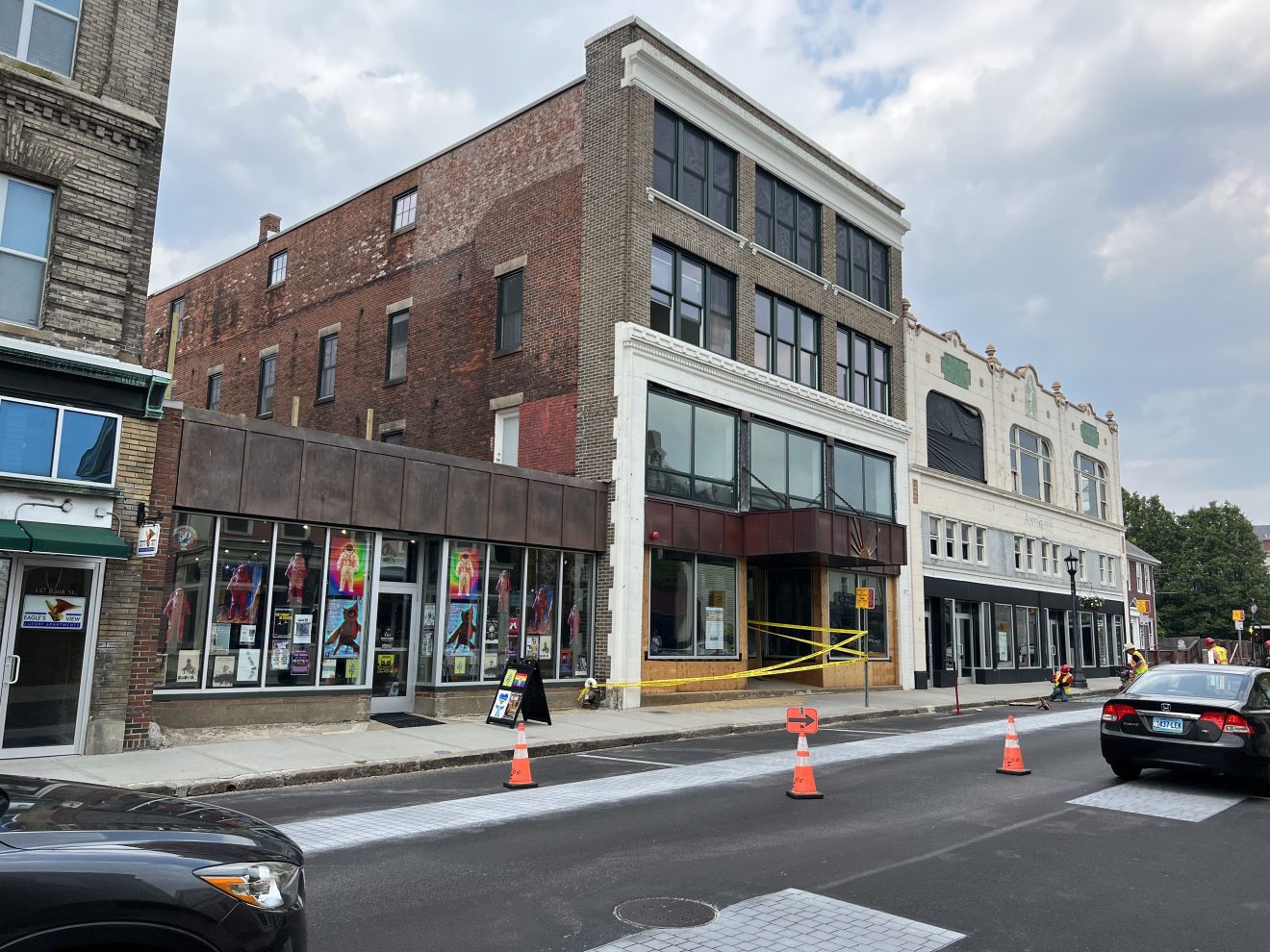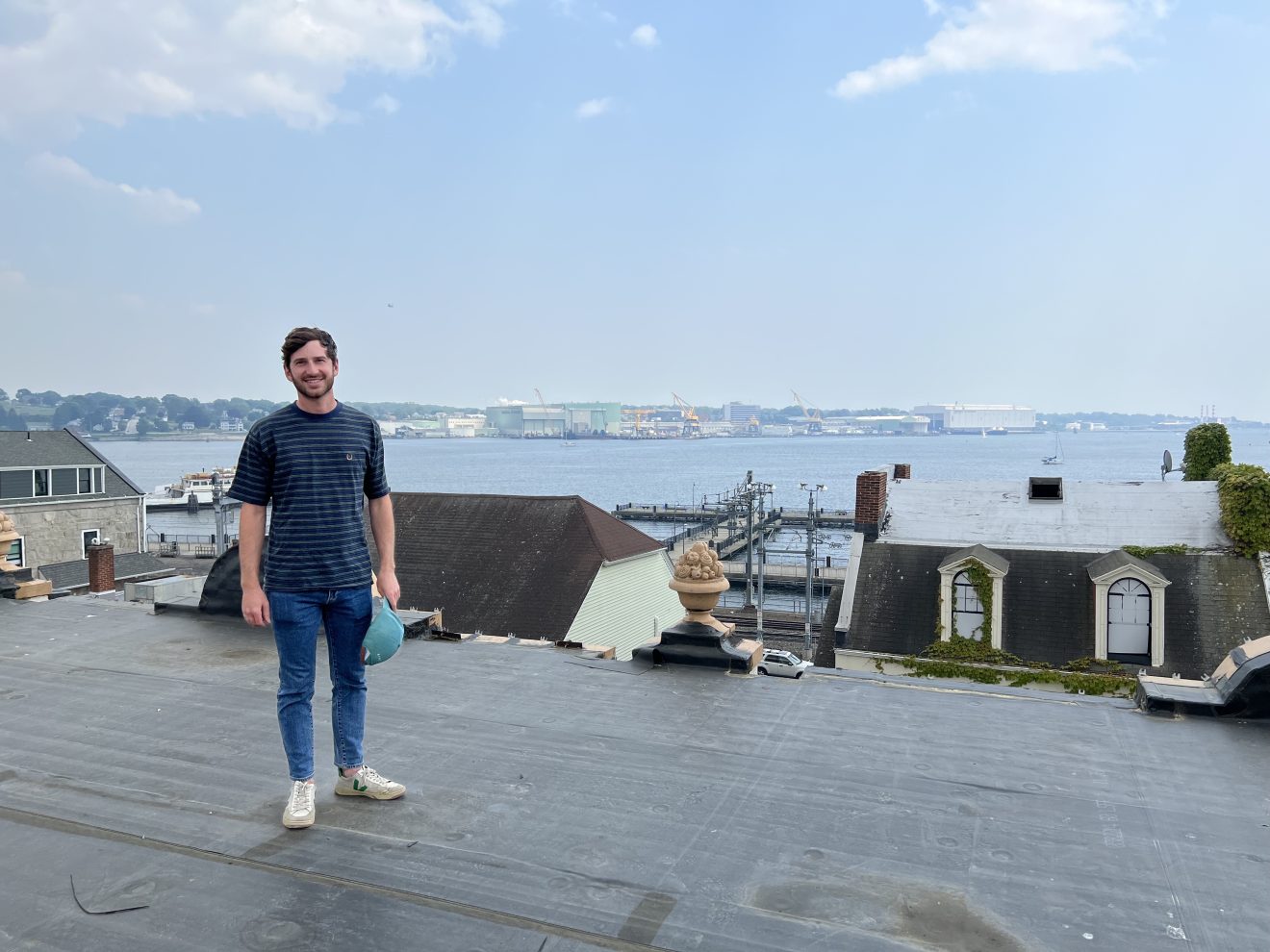NEW LONDON — Standing in a nearly finished apartment Thursday afternoon, Dash Davidson surveyed Bank Street from the third floor of a historic building he’s renovating.
“There are not a lot of places that have the kind of building stock that New London does. This whole downtown is a historic district,” he said. “It really caught our eye just because it’s a really beautiful and pretty intact downtown. And as historic developers, you gotta start with the historic buildings and that’s what New London really has in spades.”
Davidson and his business partner, Max Patinkin, are the principals of High Tide Capital, a Maine-based real estate firm focused on breathing new life into historic buildings. Their latest project involves redeveloping three adjacent buildings in downtown New London that will be known collectively as The Riverbank. The project includes the three-story 1910 building at 121-131 Bank St., the four-story 1900 building at 133 Bank St., and the one-story building at 137 Bank St.
“We’ve seen a lot of success with doing residential conversions in downtowns. Seems like people want to live down where businesses are and have a more ‘walk-live-work-play’ existence where you don’t have to get in your car all the time. And downtown New London just has a lot of opportunities for that, a lot of great buildings,” Davidson said.
The upper floors of the buildings will house 32 apartments — mostly studios and one-bedrooms — and feature several two-story townhouse-style apartments facing Bank Street. All the apartments will share a large roof deck and several units also have private roof decks.
Davidson estimated rents within a range of $1,500 for smaller units and $2,000 to $2,200 for larger ones, and even higher rents for the townhouse-style units.
“We think there’s a lot of rental demand because there’s been great employment growth here in the area. Just look outside this window – it’s a pretty beautiful place to live,” he said. “We think that the local community leaders, the politicians have done a really good job of spurring economic activity in the area … and you have major employers like Electric Boat just getting a lot of new contracts and going out on hiring sprees.”
Davidson said storefronts are an important component of his company’s projects. Tox Brewing Company, which is currently located on Broad Street, plans to open a 10,000-square-foot tap room and production facility on The Riverbank’s ground floor. A restaurant is slated for the second ground-floor space at 133 Bank St., and Telegraph Records has already moved into the one-story space at 137 Bank St.

High Tide Capital, based in Bangor, Maine, is renovating three historic buildings on Bank Street in New London, which will be collectively known as Riverbank. (CT Examiner)
Davidson also commented on the contemporary, five-story 20-unit building under construction at 174 Bank St., emphasizing the importance of retail on the ground floor.
“I believe there was a zoning exception that was passed for this building to put residential on the ground floor, and I think that’s a real mistake because when you break up the retail strip here on Bank Street — which has been a historic retail corridor for over 100 years — with a non-retail use. I think that’s a real problem and creates a challenge to bringing commercial density back to downtown.”
Davidson said he disagreed with the notion that retail is dead.
“People only want to live in cities, in downtowns, if there’s retail, if there are restaurants and stores to go to. New London needs a grocery store – why is that not here?” he said. “I believe that the more beds, the more apartments you add to a downtown, you add density. And the density and the critical mass of residents demands services and businesses. So we think it’s a cycle that will feed on itself.”
Davidson said the number of rentals being built in New London reflected people’s belief in the market.
“We think it’s only getting better – we certainly do. I mean, our company’s called High Tide Capital, and we believe rising tide lifts all ships. And so we see our projects as ships and we want to just keep riding the tide.”
The company’s philosophy is to retain its portfolio of renovated buildings rather than selling.
“We buy, we renovate and we hold. … We hold every building for at least 10 years,” he said. “If you buy these for the opportunity to keep owning them for a lifetime, there’s no reason you’d ever sell this building.”
He said an environmental report is the first step in historic redevelopment projects, followed by remediation. The more difficult part is the mechanical infrastructure – plumbing and electricity.
But Davidson said New London’s availability of skilled craftsmen who “can take the old buildings down to their bones and then bring them back to life,” make this project work.
High Tide has partnered with Parker Benjamin to provide construction management and future property management once tenants move into The Riverbank.
“We’ve found that it’s really helpful having the same group build it and manage it,” Davidson said. “That allows us to be more removed and more focused on the financing side and acquisitions and putting the deals together.”
Davidson said the projects make good business sense with the state’s historic tax credit program, which he said “really enable these projects to happen.”
Felix Reyes, director of planning and economic development for the city, previously told CT Examiner that the project was funded with federal dollars from a $6 million community challenge grant New London received from the Department of Economic Community Development to invest in housing, commercial and transportation projects.
High Tide’s first project in New London was the 1913 Manwaring Building at 225 State St., which was converted into 21 apartments for Connecticut College students.
When the company started The Riverbank project nearly two years ago, Davidson said interest rates were lower and that current higher rates were “definitely challenging” for upcoming projects.
“It’s a direct hit to the bottom line, but you’ve got to be optimistic that this isn’t gonna last forever,” he said.
He said the company has completed eight or nine projects, and while there is no “playbook,” each one is a preparation for the next.
“We’re in the preservation game. We’re in the ‘bringing these buildings back to life’ game,” Davidson said. “So any historic building that needs some love is one we’re interested in talking about.”

